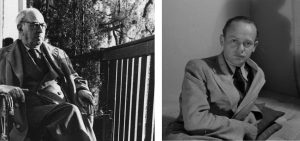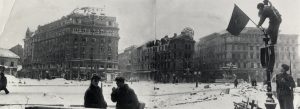Throughout my work on this project the past has had an uncanny way of becoming suddenly and unexpectedly manifest in the present. This happened recently when I was recording character voice-overs for the film. I needed someone with a Hungarian accent, who was also a fluent English speaker, to read the parts of two people in the film. One was my grandfather, Andor Weidlinger. The other was Imre Erdős who emigrated to Bolivia with my father and wrote about the experience in his memoir.

On the appointed day a dapper, elderly gentleman came to my studio for a recording session. I liked István immediately. Dressed in a dark suit with an open shirt, he had the rakish, debonair quality of a man who had seen the world, lived large, and had no regrets. His Hungarian accent was perfect, not so heavy as to be hard to understand, but authentic. He had lived in England and the United States for many years, having Hungary during the 1956 revolution. He had a grasp of English language idioms.
But the recording session did not go as easily as I anticipated. István was great for the role of Erdős, who recounted his adventures with a devil-may-care insouciance, but we got bogged down with István’s reading of Andor’s letter. Andor, his wife Rózsa, and Lulu (my father’s step sister) were Jews who had survived the Holocaust. Andor spent everything he had in bribes to keep Lulu from being put on a train to Auschwitz. He wrote to my father: “When liberation came we were in the basement, in a hole in the ground, between dead bodies and rubble. Our home was hit by a bomb. Everything that was not destroyed was looted.” István performed these three sentences with same light-hearted air that he gave to Erdős’ adventures. It’s a Hungarian trait to make light of tragedy, to make jokes in the face of death. It’s a way to survive. But it is not what I wanted. I wanted István to read Andor’s letter so that the listener could fully imagine the loss and devastation that my family experienced. I remonstrated with him, “You have to see this! You have to imagine this!”

István got quiet for a moment. Then he said to me, “Of course I can see this. I don’t have to imagine it. I was there.”
“You were?”
“Yes. I was a child of six, but I remember perfectly. I had to wear the yellow star. Everything was looted from our house, too. The neighbors said nobody believed we were coming back. But we survived. I am a survivor.” I asked István to read Andor’s letter again, and this time he did so with feeling.
Suddenly the past was not just a story—something that happened seventy years ago. It was in the room, with István remembering what he saw as a six-year old boy.
I asked István if I could write about him. He politely demurred. I understood completely. István still had business ties in Budapest and we have come to a point where, once again, it is risky to call attention to one’s identity as a Jew. Therefore István is a pseudonym.
Cynthia Eaton
July 21, 2019 at 3:16 pmWOW!!